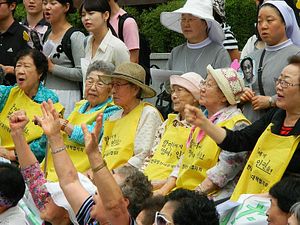On his last day in South Korea, Pope Francis met with a number of “comfort women,” women forced into sexual slavery by the Japanese army during World War II. The pope met the seven women at the Myeongdong Cathedral in Seoul, prior to a mass calling for peace and reconciliation between North and South Korea. One of the women gave the pope a butterfly pin, which is used to symbolize the comfort women’s plight. Pope Francis wore the pin throughout the ensuing mass. The mass was also attended by South Korean President Park Geun-hye.
The Yonhap News Agency reported in early July that a number of comfort women, many of whom are Catholic, would be at the August 18 mass. At that time, however, it was unclear if Pope Francis would meet with them personally, or if they would simply be part of the congregation. The pope apparently agreed to a personal interaction with the women. Yonhap said that the South Korean committee in charge of preparing for the pope’s visit had informed his office that the comfort women had been invited. Presumably, the pope was also made aware of the women’s significance in on-going tensions between Japan and South Korea.
The plight of the comfort women is symbolic of unresolved issues left over from World War II and the Japanese occupation of the Korean Peninsula. South Korea’s government has demanded that Japan apologize for the harm done to these women, as well as paying them compensation. Japan maintains that South Korea forswore the right to demand compensation when it reestablished diplomatic relations with Tokyo in 1965. Further, Japan points to money offered to the comfort women from private contributors, but Seoul believes this unofficial compensation is not enough.
Occasionally, Japanese officials make comments denying or downplaying the existence of comfort women. Earlier this year, the chairman of NHK, Japan’s national public broadcaster, outraged Koreans by saying that the use of comfort women “was a fact of those times” and should not be judged by modern moral standards. Predictably, these comments were roundly denounced in South Korea.
Prime Minister Shinzo Abe himself has gone on record as saying he is “deeply pained to think of the comfort women who experienced immeasurable pain and suffering.” Abe also said he had no intention of revoking the 1993 Kono Statement, wherein then-Japanese Chief Cabinet Secretary Yohei Kono expressed Japan’s “sincere apologies and remorse” for the harm done to comfort women. However, Abe undid whatever goodwill he won with that promise through the puzzling decision to authorize a government review of the origins of the Kono Statement — a review that many Koreans felt was designed to undermine the official apology and cast doubt on Japan’s culpability.
Now, the meeting between Pope Francis and a group of comfort women is being taken by many as a move legitimizing their plight. Japan’s Kyodo News agency, reporting on the meeting, said that the pope’s action “is likely to influence international opinion on the issue.”
While the presence of “comfort women” calls to mind unresolved historical tensions between South Korea and Japan, the pope’s final mass in South Korea was dedicated to the issue of Korean reconciliation. Associated Press quoted Pope Francis as calling for all Koreans to overcome the “mindset shaped by suspicion, confrontation and competition” between their two countries in order to make peace. The pope prayed “for an ever greater recognition that all Koreans are brothers and sisters, members of one family, one people.” The mass was reportedly attended by defectors from North Korea.

































